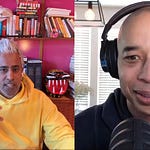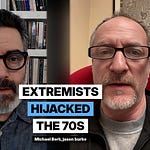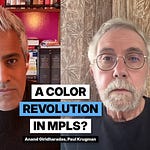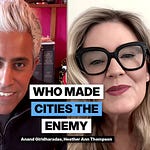Yesterday, we published Anand’s essay on the deeper dynamics beneath the UnitedHealthcare CEO shooting.
Later, he went on MSNBC to talk about it. Katy Tur, the host, and he discussed the importance of deploring violence and, at the same time, being curious about what is enabling it. They talked about the state of healthcare for millions in America, and the common political emotion that seems to unite Americans of every stripe nowadays.
We hope The Ink will be essential to the thinking and reimagining and reckoning and doing that all lie ahead. We want to thank you for being a part of what we are and what we do, and we promise you that this community is going to find every way possible to be there for you in the times that lie ahead and be there for this country and for what it can be still.
“A sense of defenselessness”: a transcript
KATY: I think that when you have a lot of people cheering violence in the way that they have, you can deplore the cheering of the violence, but you have to ask yourself, why in the world do they feel good or okay with cheering it on? And it's because there is so much burning anger over the system in this country, broadly speaking, but also very much about healthcare because it's something that everybody deals with — not every day maybe, but for some people every day — but at some point in their lives, they get denied a claim or they get a bill that they can't understand and they're put into a financially dire situation for healthcare that they need. And so it's something that cuts across the political spectrum.
You're talking about how there is a way to condemn the violence and also address the problem. And by addressing the problem, addressing the anger, you're actually gonna stop more violence from happening.
ANAND: Absolutely. When you look at an act like this — lest anybody caricature our conversation — it is very clear that assassination is not how you get change. It's not how you get the world you want. It doesn't work. It's immoral, but it also doesn't work. End of story.
But if that's the end of the analysis, we have a problem. And when you have, as you say, and I'm glad you played those social media videos, 'cause it shows, you know, not just what people on cable are saying, but what people in the country with their phones are saying.
KATY: It's a conversation that everybody's having. I walk down the street, I hear people talking about it. It's not just what you're seeing on social media. Oftentimes social media conversations are niche. This one is broad.
ANAND: This is the defining challenge in the lives of millions of people, maybe tens of millions of people. And if not the defining one, then a secondary one in almost everybody else's, right? Your health. Whether you can have a child or not and not have a $50,000 bill by accident. Whether something breaks or not, you can get it fixed. I know so many people — who actually have decent insurance, have some financial cushion if something goes wrong — and still things happen to them where they get a mysterious $100,000 bill for a shoulder surgery. This is a friend of mine, told me this after this happened the other day. A mysterious $100,000 bill — with insurance.
KATY: I had a $90,000 bill for an emergency appendectomy that insurance refused to cover.
ANAND: So let's be honest, since we're having an honest conversation. The reality in this country is if you kill people with a gun, it is very obvious to everybody what's going on and you're rightly deplored. And we should deplore that.
If it is a more systemic kind of killing, as your social media person was saying, if people are being killed through PDF files and through claim denial letters, and through a deliberate practice of saying no to a certain form of care that you know you're gonna end up granting, but if you say no, 80 percent of people will lose steam and not appeal successfully and you'll only have to give it to 20 percent of those people and you factor that into your balance sheet.
And if that is not an incidental thing that happens or bad apples, that's actually how you make money because the health insurance industry is an industry that doesn't really exist in many other countries 'cause they just take care of each other as part of their society. You cannot expect to live in a society in which that rage goes nowhere, just fizzles out and dissipates. And we have to deplore violence and then be curious about where it's coming from.
KATY: The gentleman that I led into this with, Congressman Ro Khanna, said he understands this is part of the reason or a big reason why Donald Trump got elected because so many Americans are fed up with a system that is no longer working for them that they chose the party and the person that promised to change things. Instead of the party that was seen as the defender of the status quo. And there's been a lot of analysis about this. Chris Murphy's talked about it. Bernie Sanders has talked about it. Lots of people have come out and said this is the Democrats' fundamental problem.
Do you see this as something that is actually going to get addressed by the Republicans? I mean, they've promised a lot of big change. Is what you're seeing from who Donald Trump has so far surrounded himself with, are these folks that are gonna help people out with a predatory insurance system?
ANAND: Unless RFK Jr.'s raw milk deliveries are gonna cure all these conditions, no, I don't think so. No help is gonna come from these Republicans. But you're right that the reason many people turn to them is the desperation.
And I think, you know, when you and I or anybody else here has a conversation, it's usually one issue at a time. We're talking about healthcare now, we're talking about the border. I think there's a more generalized political emotion in this country.
A lot of what I write about is the political emotions underlying these issues. If you go beneath the trans rights fight, what's happening with your kids in school, or beneath the border fight, or beneath what was January 6th about? A very common political emotion on the left and right is a sense of defenselessness.
I would argue it is the common culture right now that unites 80 to 90 percent of Americans. A feeling that no one's coming to help you, no one's hearing you, the people trying to tell you how things are, maybe people like you and me, there's a feeling that we don't get you. We don't reflect reality. There's a feeling that people with money don't care. People who run companies don't care. Your employer doesn't care. And it is not neatly mapped onto therefore you're the left or you're the right. It is not neatly mapped onto issues. It is a generalized pessimism about being heard and being helped. And that is the most dangerous thing for a society because then people wrongly, but predictably will start going it alone.
KATY: And it's been festering now for a while. I wrote in my 2016 book about Donald Trump's first win, that part of what fueled it is this feeling of helplessness, defenselessness, lack of agency, that it felt like you were screaming at the top of your lungs in a room full of people wearing headphones. And that is still the predominant feeling. It might not be the one that everyone vocalizes, but it's the one that people feel in this country. They don't feel like they have control. Social media is taking advantage of them. CEOs are taking advantage of them. The New York Times opinion page called it the new Gilded Age that we're living through. And it does certainly feel like that.
To read Anand’s essay that sparked this conversation, visit the link below:
Your support makes The Ink possible, so if you haven’t joined already, we’d be honored if you’d become a paid subscriber. When you do, you’ll get access each week to our regular posts and our interviews with the most thoughtful people out there — and you’ll be able to join the conversation in our comments section.












